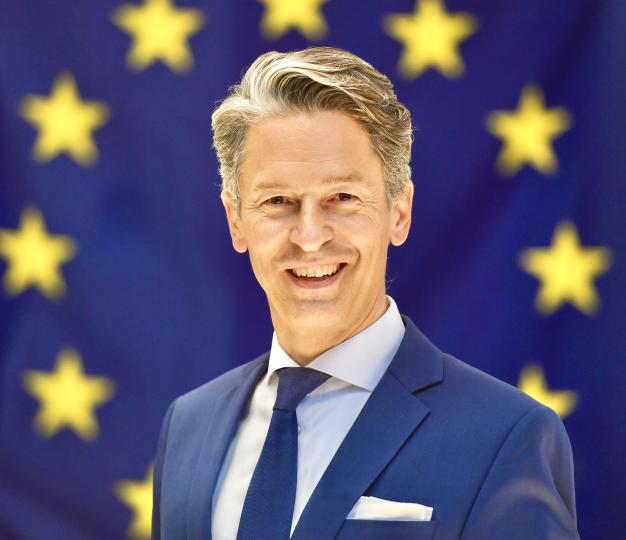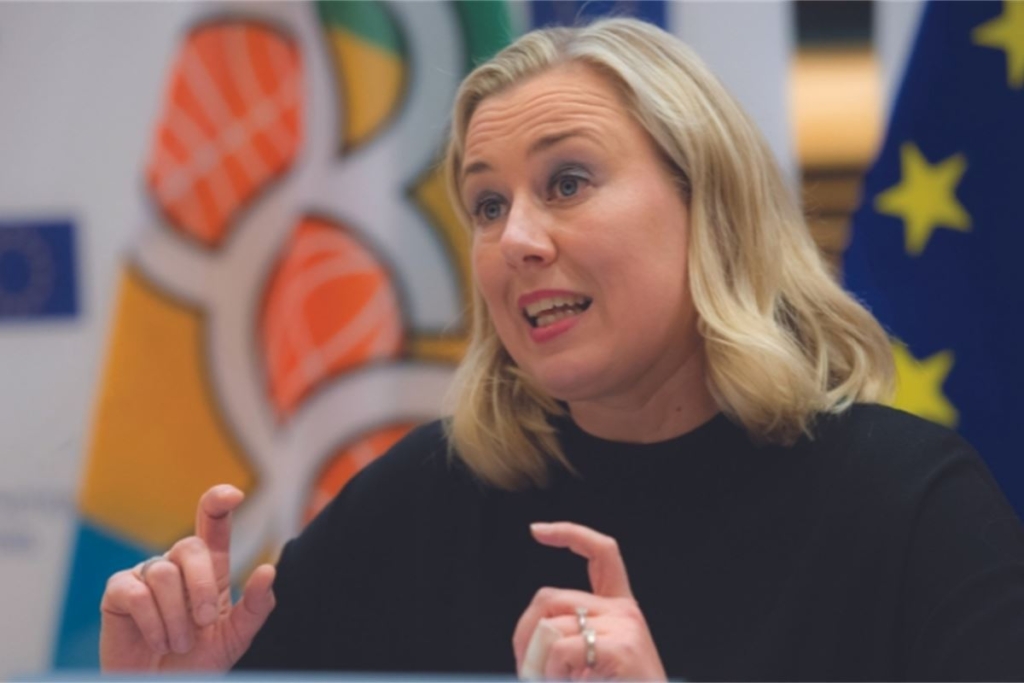This is a commentary from Fabrice Houdart’s weekly newsletter on LGBTQ+ Equality. Click here to subscribe. Houdart is executive director of the Association of LGBTQ+ Corporate Directors.

Ambassador Jan Sadek, head of the European Union delegation to Uganda
COMMENTARY
The EU masters double-speak in Uganda
The EU and Amb Sadek’s cynicism over the 2023 Anti-Homosexuality Act contrasts strongly with the EU stance against the 2014 [Anti-Homosexuality Act]. Is the Union transitioning to its post-human rights iteration?
By Fabrice Houdart
The controversial handling of Uganda’s 2023 Anti-Homosexuality Act (AHA) by the European Union and the blatant disregard by [Ambassador Jan Sadek, head of the European Union delegation to Uganda] for the gravity of the AHA have irked LGBTQ+ activists globally —last week’s demonstration is only the tip of the iceberg.
A year has passed since Uganda’s government, under President Museveni, enacted this law, which includes draconian measures such as the death penalty for certain same-sex acts but also effectively bans LGBTQ+ workplace inclusion efforts. This law not only contravenes international human rights standards but directly challenges the dignity and existence of LGBTQ+ people in Uganda, with numerous incidents of mob justice being recorded. (The Office of the U.N. High Commissioner for Human Rights reports that close to 600 people have been subject to human rights violations and abuses as a result of the AHA).
EU’s Reaction: Public Condemnation vs. Private Inaction
The EU initially expressed outrage over the law’s enactment. On May 29th, the EU’s top diplomat, Josep Borrell, articulated the Union’s opposition, emphasizing that the law contradicted international human rights and Uganda’s commitments under the African Charter on Human and Peoples’ Rights.
It makes sense: the EU has been asserting itself as a world leader in the fight to protect human rights. They claim they are leading the call for equality of LGBTQ+ persons worldwide by implementing actions supporting their rights as per the LGBTIQ Equality Strategy (2020-2025) and the EU Action Plan on Human Rights and Democracy (2020-2024).

Jutta Urpilainen, European Commissioner for International Partnerships. (Photo courtesy of Parliament Magazine)
European Commissioner Jutta Urpilainen wrote in 2020: “Africa and Europe should stand up for a model of international cooperation, based on rules-based multilateralism, political freedom, solidarity, and human dignity. Inclusivity will enable us to harness the full potential of our citizens, including the youth and women.”
Despite these strong words, the EU’s actions—or lack thereof—tell a different story.
Funding and Dialogue: Is it Enough?
Over the past year, the EU has maintained its financial engagements in Uganda, justifying that cutting off funds would harm vulnerable populations and leave a vacuum that could be filled by actors who do not share European values (i.e., the Chinese scarecrow).
On September 6, 2023, Jutta Urpilainen said that the “EU considers that a suspension of EU financial support to Uganda would deprive the most vulnerable populations, including LGBTIQ persons, from vital support” and that “disengagement by the EU would also create gaps which may be further filled by other players who do not share EU values.”
“We are better than the worst” is a weird justification in the first place. It also contradicts previous events, such as the EU suspending aid immediately after corruption was uncovered. Double standard, much?
Finally, it is a cop-out when both the World Bank and the U.S. have shown that it is possible to redirect financial support to ensure that it does not bolster the very entities enforcing the oppressive law.
Scaling Up Engagement
Even more troubling is the scaling up of the EU’s engagement through development aid and investments from the European Investment Bank (EIB). Recent initiatives include a €100 million support package focused on microbusinesses and women entrepreneurs.
While these initiatives are commendable for their focus on economic empowerment, they obviously strengthen the hands of a government that simultaneously enacts and enforces regressive and harmful laws against a marginalized community.
On March 6th and April 11th, the EU announced new moves to expand EU investment in business and infrastructure with zero consideration for upholding EU commitments to non-discrimination and human rights. It would anyway be illegal, as the law says any assertion of the human rights of LGBTQ+ people is a promotion of homosexuality, punishable by 20 years in prison, by the way.
This is from the letter to Commissioner Urpilainen, sent by Convening For Equality (CFE) on April 16 asking for a comprehensive review of all EU funding to Uganda and for a pause or reprogramming of any funds:
“Leadership of the European Commission has pursued major new funding initiatives with the same Ugandan leaders who are vigorously enforcing this law, without consideration for upholding and enforcing the European Union’s stated values. No public action amounts to an abandonment of our rights and your values. For example, you recently publicly celebrated a new €200 million business investment to Uganda with no mention of how Uganda or affiliated private sector institutions will be held accountable for ensuring non-discrimination and protection of human rights when spending this new EU funding.”
Is Ambassador Jan Sadek gaslighting us?
In the meantime, Ambassador Jan Sadek, head of the European Union delegation to Uganda, went one step further by scaling up his social media portrayal of himself and various EU officials cozying up to the main sponsors of the anti-homosexuality Act. Here is a litany of tone-deaf EU tweets on X in the past few days celebrating the vibrant Ugandan democracy:
- [A €40 million forest partnership project in cooperation with President Yoweri Museveni and other Ugandan officials]: https://x.com/VSinkevicius/
status/1777733369796731267 and https://twitter.com/ Earthfindsug/status/ 1778035327329874343 and https://x.com/JanSadek/status/ 1778492492591092149 and https://x.com/UNODC_EA/status/1778686578241511646 - [A project boosting the Ugandan film industry] https://x.com/JanSadek/status/
1780314713638764670 - [An EU-Uganda business forum, announced with President Museveni.] https://substack.com/redirect/bff93740-1658-4245-a83f-7582a54ea791?j=eyJ1IjoiNDhhMTYifQ.BTU72sWymn2-PP8doEEKyzsIwXJa7Pma6tNxIBQ8rWU
The Dichotomy of EU Pragmatism vs. American Dramatism
Privately, EU officials have mocked the American responses—which included imposing visa restrictions and suspending loans—as overly “dramatic,” positioning their own approach as pragmatic and nuanced. This ‘pragmatism,’ however, appears to be a guise for prioritizing economic and political interests over fundamental human rights, a stance that risks undermining the EU’s credibility on the global human rights stage. The reality is that the EU has PTSD from a past falling out with Museveni and is effectively throwing LGBTQ+ people under the bus to avoid a possible conflict and cater to Jan Sadek’s popularity contest.
What Should Be Done?
The EU must reassess its strategies in Uganda. The EU should leverage its considerable influence to enact real change rather than mere dialogue and financial aid that flows through government channels. This could include conditional aid, targeted sanctions against individuals responsible for human rights abuses, and a more transparent assessment of how EU funds are used on the ground to ensure they do not support oppressive elements of the Ugandan government. Finally, the EU should develop a clear policy.
Conclusion: A Call for Genuine Commitment to Human Rights
The EU prides itself on being a beacon of human rights and dignity, often opposing its principles to that of the Chinese and even the US. However, its actions in Uganda reflect a disheartening divergence from these values when it comes to LGBTQ+ people. As members of the global community committed to human rights, it is our responsibility to hold such powerful entities accountable and urge them to match their rhetoric with action that genuinely protects and uplifts all individuals, regardless of their sexual orientation or gender identity.
[An unbelievable finale: This post by Jan Sadek states, “The European Union Delegation to Uganda supports the country’s efforts to … defend human rights” !]
Also by Fabrice Houdart: The West fiddles while Uganda prepares a future of anti-LGBTQ horrors (April 2024, Erasing 76 Crimes)
Source: African Human Rights Media Network member Erasing 76 Crimes.



COMMENTS